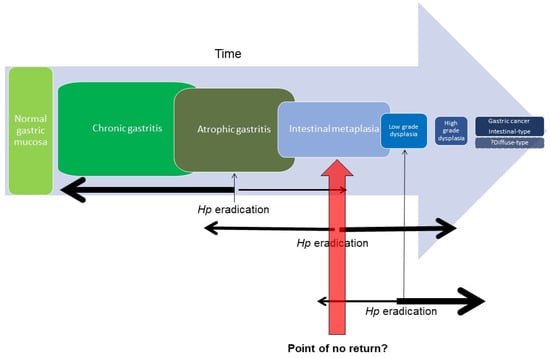Diagnosis, Treatment and Prevention of Gastrointestinal Cancer
Share This Topical Collection
Editors
 Dr. Anna Kakehashi
Dr. Anna Kakehashi
 Dr. Anna Kakehashi
Dr. Anna Kakehashi
E-Mail
Website
Collection Editor
Department of Molecular Pathology, Graduate School of Medicine, Osaka Metropolitan University, Osaka 545-8585, Japan
Interests: gastrointestinal cancer; diagnosis; biomarker; anti-cancer drug; molecular mechanisms
Special Issues, Collections and Topics in MDPI journals
 Dr. Min Gi
Dr. Min Gi
 Dr. Min Gi
Dr. Min Gi
E-Mail
Website
Collection Editor
Department of Environmental Risk Assessment, Graduate School of Medicine, Osaka Metropolitan University, Osaka 545-8585, Japan
Interests: colorectal cancer; molecular mechanisms; chemoprevention; anti-cancer drug
Topical Collection Information
Dear Colleagues,
The discovery of novel strategies for gastrointestinal cancer diagnosis, treatment and prevention remains a matter of utmost importance. In our efforts to develop effective therapies and anti-cancer drugs, recent research has focused on innovative molecular, biochemical, pathological and immunological developments. In this respect, investigation of the mechanisms of carcinogenesis is crucial to developing cancer screening methods and therapies for application in clinical practice. Furthermore, the discovery of new chemopreventive agents can also help in the fight against cancer.
This Topical Collection will present an overview of the most recent studies on advancements in diagnosis, anti-cancer drugs and chemopreventive agents for gastrointestinal cancers. Topics of interest include 1) cancer diagnosis, 2) carcinogenesis models for the discovery of cancer risk factors, innovative drugs and chemopreventive agents, 4) investigation of molecular mechanisms of carcinogenesis, 5) discovery of novel cancer biomarkers and molecular targets, and 6) preclinical innovative studies.
Dr. Anna Kakehashi
Dr. Min Gi
Collection Editors
Manuscript Submission Information
Manuscripts should be submitted online at www.mdpi.com by registering and logging in to this website. Once you are registered, click here to go to the submission form. Manuscripts can be submitted until the deadline. All submissions that pass pre-check are peer-reviewed. Accepted papers will be published continuously in the journal (as soon as accepted) and will be listed together on the collection website. Research articles, review articles as well as short communications are invited. For planned papers, a title and short abstract (about 100 words) can be sent to the Editorial Office for announcement on this website.
Submitted manuscripts should not have been published previously, nor be under consideration for publication elsewhere (except conference proceedings papers). All manuscripts are thoroughly refereed through a single-blind peer-review process. A guide for authors and other relevant information for submission of manuscripts is available on the Instructions for Authors page. Cancers is an international peer-reviewed open access semimonthly journal published by MDPI.
Please visit the Instructions for Authors page before submitting a manuscript.
The Article Processing Charge (APC) for publication in this open access journal is 2900 CHF (Swiss Francs).
Submitted papers should be well formatted and use good English. Authors may use MDPI's
English editing service prior to publication or during author revisions.
Keywords
- cancer screening
- diagnosis
- anti-cancer drugs
- mechanisms of carcinogenesis
- chemopreventive agents
Published Papers (2 papers)
2023
Open AccessReview
Gastric Intestinal Metaplasia: Challenges and the Opportunity for Precision Prevention
by
Douglas Tjandra, Rita A. Busuttil and Alex Boussioutas
Viewed by 3509
Abstract
GIM is a persistent, premalignant lesion whereby gastric mucosa is replaced by metaplastic mucosa resembling intestinal tissue, arising in the setting of chronic inflammation, particularly in the context of
Helicobacter pylori. While the overall rates of progression to gastric adenocarcinoma are low,
[...] Read more.
GIM is a persistent, premalignant lesion whereby gastric mucosa is replaced by metaplastic mucosa resembling intestinal tissue, arising in the setting of chronic inflammation, particularly in the context of
Helicobacter pylori. While the overall rates of progression to gastric adenocarcinoma are low, estimated at from 0.25 to 2.5%, there are features that confer a much higher risk and warrant follow-up. In this review, we collate and summarise the current knowledge regarding the pathogenesis of GIM, and the clinical, endoscopic and histologic risk factors for cancer. We examine the current state-of-practice with regard to the diagnosis and management of GIM, which varies widely in the published guidelines and in practice. We consider the emerging evidence in population studies, artificial intelligence and molecular markers, which will guide future models of care. The ultimate goal is to increase the detection of early gastric dysplasia/neoplasia that can be cured while avoiding unnecessary surveillance in very low-risk individuals.
Full article
►▼
Show Figures
Open AccessSystematic Review
Outcomes of Robot-Assisted Surgery in Rectal Cancer Compared with Open and Laparoscopic Surgery
by
Elias Khajeh, Ehsan Aminizadeh, Arash Dooghaie Moghadam, Rajan Nikbakhsh, Gil Goncalves, Carlos Carvalho, Amjad Parvaiz, Yakup Kulu and Arianeb Mehrabi
Cited by 11 | Viewed by 2868
Abstract
With increasing trends for the adoption of robotic surgery, many centers are considering changing their practices from open or laparoscopic to robot-assisted surgery for rectal cancer. We compared the outcomes of robot-assisted rectal resection with those of open and laparoscopic surgery. We searched
[...] Read more.
With increasing trends for the adoption of robotic surgery, many centers are considering changing their practices from open or laparoscopic to robot-assisted surgery for rectal cancer. We compared the outcomes of robot-assisted rectal resection with those of open and laparoscopic surgery. We searched Medline, Web of Science, and CENTRAL databases until October 2022. All randomized controlled trials (RCTs) and prospective studies comparing robotic surgery with open or laparoscopic rectal resection were included. Fifteen RCTs and 11 prospective studies involving 6922 patients were included. The meta-analysis revealed that robotic surgery has lower blood loss, less surgical site infection, shorter hospital stays, and higher negative resection margins than open resection. Robotic surgery also has lower conversion rates, lower blood loss, lower rates of reoperation, and higher negative circumferential margins than laparoscopic surgery. Robotic surgery had longer operation times and higher costs than open and laparoscopic surgery. There were no differences in other complications, mortality, and survival between robotic surgery and the open or laparoscopic approach. However, heterogeneity between studies was moderate to high in some analyses. The robotic approach can be the method of choice for centers planning to change from open to minimally invasive rectal surgery. The higher costs of robotic surgery should be considered as a substitute for laparoscopic surgery (PROSPERO: CRD42022381468).
Full article
►▼
Show Figures









